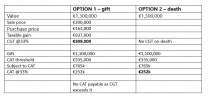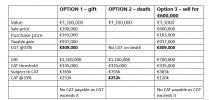goldenfolden
New Member
- Messages
- 2
Hi,
I am currently in my 70s and my son in his early 30s. I have a pre63 property in Dublin but it is turning into a lot of work for myself to keep looking after it. There are 9 units in the property and there is always something to do, whether it's small refurbishments when tenants leave, problems with the plumbing, disputes between tenants etc. My son tries to help when he can but he has his own career and works long hours. My son has no property at the moment and can't afford a house in Dublin with the prices.
The property is taking in close to €100k per year and is my pension. Similar houses in the area are selling for approximately €1.3m. I bought the house in the early 90s for £130k and there is €200k of a mortgage left on the property. If I sell the property now (option 1) I will pay CGT and my son will have to pay CAT on that too when he inherits it.
I was thinking about gifting the property to my son now (option 2) and he can sell it which would mean he would only be paying CAT. With the money left over he would have a decent deposit for a house and could buy 2 apartments which could be rented out. I would then take the rental income for myself which I could use as my pension. I do trust my son 100% and him giving me the monthly rent would not be an issue. Would you be able to advise on any alternative options or problems that may arise with this situation. I would like to give my son some money as a deposit and also have some rental income.
OPTION 1 OPTION 2
Sale price €1,300,000 Sale price €1,300,000
Deduct mortgage - €200,000 Deduct mortgage - €200,000
Purchase price - €163,000 Taxable gain €1,100,000
Taxable gain €937,000 Sons CAT threshold €335,000
CGT @ 33% €309,210 CAT@33% €252,450
Remaining €790,790 Remaining €847,550
Sons CAT threshold €335,000
Taxable €455,790
CAT @33% €150,410
Remaining €640,380
I am currently in my 70s and my son in his early 30s. I have a pre63 property in Dublin but it is turning into a lot of work for myself to keep looking after it. There are 9 units in the property and there is always something to do, whether it's small refurbishments when tenants leave, problems with the plumbing, disputes between tenants etc. My son tries to help when he can but he has his own career and works long hours. My son has no property at the moment and can't afford a house in Dublin with the prices.
The property is taking in close to €100k per year and is my pension. Similar houses in the area are selling for approximately €1.3m. I bought the house in the early 90s for £130k and there is €200k of a mortgage left on the property. If I sell the property now (option 1) I will pay CGT and my son will have to pay CAT on that too when he inherits it.
I was thinking about gifting the property to my son now (option 2) and he can sell it which would mean he would only be paying CAT. With the money left over he would have a decent deposit for a house and could buy 2 apartments which could be rented out. I would then take the rental income for myself which I could use as my pension. I do trust my son 100% and him giving me the monthly rent would not be an issue. Would you be able to advise on any alternative options or problems that may arise with this situation. I would like to give my son some money as a deposit and also have some rental income.
OPTION 1 OPTION 2
Sale price €1,300,000 Sale price €1,300,000
Deduct mortgage - €200,000 Deduct mortgage - €200,000
Purchase price - €163,000 Taxable gain €1,100,000
Taxable gain €937,000 Sons CAT threshold €335,000
CGT @ 33% €309,210 CAT@33% €252,450
Remaining €790,790 Remaining €847,550
Sons CAT threshold €335,000
Taxable €455,790
CAT @33% €150,410
Remaining €640,380

